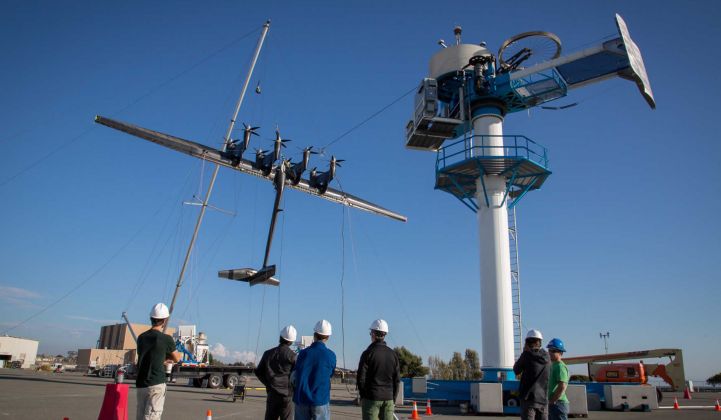Google parent company Alphabet has dropped its support for Makani Power, the highest-profile airborne wind energy company, raising questions about the sector's future.
GTM confirmed that other airborne wind energy (AWE) hopefuls, such as Ampyx Power and Kitenergy, are pressing ahead with technology tests despite Alphabet's decision. But the fact that even Alphabet, with its deep pockets, could not get AWE to fly raises doubts over the viability of the technology amid ongoing cost declines in other renewable energy sectors.
Alphabet, which in addition to Google owns a series of what it terms "other bets," including the moonshot division named X, announced it would no longer support Makani.
“Makani's time as an Other Bet is coming to an end,” said Astro Teller, captain of moonshots at X and chairman of the Makani board, in a statement. “After considering many factors, I believe that the road to commercial viability is a much longer and riskier road than we'd hoped and that it no longer makes sense for Makani to be an Alphabet company.”
The move leaves the 13-year-old firm facing an uncertain future. Alphabet said that Shell, which has a stake in the California-based company, was mulling whether to continue developing the technology as part of its offshore wind technology roadmap.
In an emailed statement, Dorine Bosman, vice president of wind development at Shell, said: “We believe that Makani remains one of the leading airborne-wind technologies in the world, and we are exploring options to continue developing the technology within our New Energies strategy."
Shell and Makani had been interested in producing power on offshore platforms.
“While this is a huge disappointment to the AWE community, this certainly doesn’t mean the industry is dead," said Rachel Shifman, wind analyst at BloombergNEF.
"Makani was arguably the most advanced of the airborne wind companies, but there are over 15 other AWE companies that we track, most of which use completely different technologies from Makani’s," Shifman said.
Other AWE companies remain positive
While the specifics of AWE technologies vary, the idea focuses on harnessing the stronger and more reliable winds high above the earth's surface. Other leading AWE players remain bullish on the concept.
Willemijn Romijn-Kasteleijn, communications manager at AWE technology developer Ampyx Power, of The Hague, Netherlands, said: “We are working toward a test flight campaign with our precommercial demonstrator in the second half of this year.”
And Stefano Sanmartino, chief operating officer at Italy’s Kitenergy, said his company is due to carry out further tests on its kite-based AWE concept next month. “We are here and still working on our prototype,” he told GTM.
The Kitenergy team had been “obviously surprised” by the news at Makani, he said.
A number of other AWE companies are still thought to be active, including EnerKite and SkySails Power in Germany and Kitepower in the Netherlands. However, there are also signs the once-packed AWE startup ecosystem may be thinning.
GTM was unable to verify the current status of KiteGen in Italy and e-Kite in the Netherlands, for example, while Altaeros Energies appears to have pivoted away from energy generation and toward airborne communications systems.
AWE has always been a long-term bet, with analyst firm BloombergNEF predicting it could take five to 10 years to achieve commercialization.
And a 2018 study by the European Union stated, “It remains unclear whether the technology can ultimately reach cost-competitiveness and contribute to EU energy security and decarbonization targets,” although it recommended continuing support for AWE concepts.
Sanmartino said that Makani may have been trying to achieve too much too soon, even by the sluggish standards of the AWE community. “We are focusing on a totally different approach and different model [than] Makani,” he said.
Kitenergy is hoping to achieve commercialization within a niche market before hitting the mainstream, Sanmartino said. Moving directly to power generation on offshore platforms, as planned by Makani and Shell, represents “another game” entirely.
In its statement on Makani, Alphabet said the firm “asked questions no one had seriously considered before, like whether it would really be possible to make wind energy cheaper and more accessible by replacing thousands of pounds of steel with smart software and advanced materials.”
Those questions remain. But with Alphabet no longer willing to fund the research, it is unclear whether they will ever be answered.




